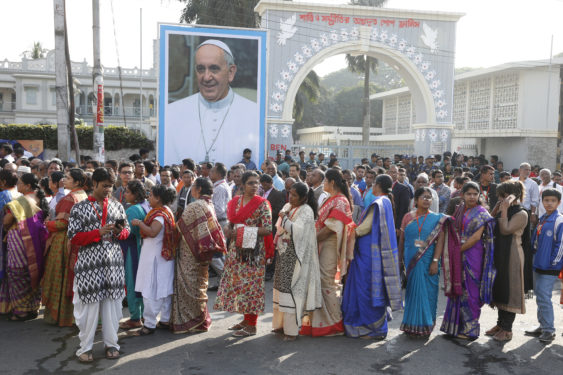By Father Francis Sunil Rosario

The emergence of the Bangladeshi migrants began in early 70s soon after the war of freedom (1971) from Pakistani rule. The Christian community being a minority in this new nation had to face the challenges of security, safety and future of their families. A sizeable number of families found their greener pastures in America, Canada and Australia. In each of these countries, they are the diaspora community searching for their identity in a multicultural context.
The Bengali Catholics
The Bengali Catholics – from Bangladesh and India – celebrate the major feasts and festivals during the liturgical year in a Bengali way.
During the solemnity of Christmas and Easter, they seek their family reunion and create opportunities to keep their Bengali traditional family bonds strong. Christmas is the time for family reunion. The other specific devotions to St. Anthony and St. Francis Xavier are also quite significant to this community.
Despite their settlement in a foreign land, they try to preserve these devotions and traditions like many other ethnic groups and communities who have come to these countries for a better future and education of their children.
The Bengali community has to learn a lot from the Hispanic/Latino communities in America, who have kept their faith alive through their various community celebrations, round the year.
If the Bengali Catholic community has to survive in America, their first task would be to remain united for the cause of the Church and God’s Kingdom. Any divisiveness within the community is detriment to give identity and recognition in mainstream society of America.
The Bengali Catholic community has to come out of its ‘narrow domestic walls’ mentality and accept Universalism and a multi-cultural approach to build unity among themselves and in association with others who have similar longings in U. S.
We have leaders to inspire, like Tagore and Nazrul. Besides, B.R. Ambedkar, Gandhi, and Maulana Kalam Azad can inspire others to live in harmony and unity despite many diverse cultural and religious backgroundscan .
As African-Americans have established themselves in the U. S. after years of struggle and fighting for cultural and racial freedom, so too must the Bengali Catholic community be united if they want to achieve their goals to contribute to the society and nation in America.
There are immense opportunities and situations where the Bengali Catholic community can shine and definitely share their mite to build America and American society. The future for Bengali-Americans are bright.
The Melting Pot
The presence of Bengali Catholic community in U. S. is hardly noticeable in the mainstream U. S. population. There are numerous ethnic communities with divergent cultural and religious backgrounds who have found footing into the American soil.
For economic and social sustenance, the Bengali Catholic community is still trying to find its way out to establish themselves as a community of people with its specific cultural and religious backgrounds.
The Diocese of Brooklyn is one of the leading dioceses in the U.S. building communion of communities and encouraging various ethnic and linguistic groups to preserve their specific socio-cultural life through various apostolates.
Even though the Bengali Catholic migrants have been in the diocese for over four decades, we don’t have a Bengali Apostolate.
Hopefully in the near future, the light will shine on this community that they will be able to bring them together to build themselves as ‘diaspora’.
The plight of migrants and refugees was the focus of Pope Francis’ New Year’s prayers of World Peace Day (2018) when he urged the world to show greater solidarity with them and their quest for peace. During his pontificate, he demonstrated his concern for migrants and refugees as one of the major concerns.
“Let’s not extinguish the hope in their hearts; let’s not suffocate their hopes for peace,” the pope said. “For this peace, which is the right of all, many of them are willing to risk their lives in a journey that, in most cases, is long and dangerous and to face trials and suffering.”
Pope Francis said it is important that everyone, including individuals, governments, schools, churches and church agencies, make a commitment to “ensuring refugees, migrants – everyone – a future of peace.”
May the Bengali migrants, who are the beneficiaries in many ways from the diocesan infra-structures, be able to commit themselves to create such endeavors that will unite them and work together towards building God’s Kingdom in this part of the world. May the light of Christ shine on them always.
